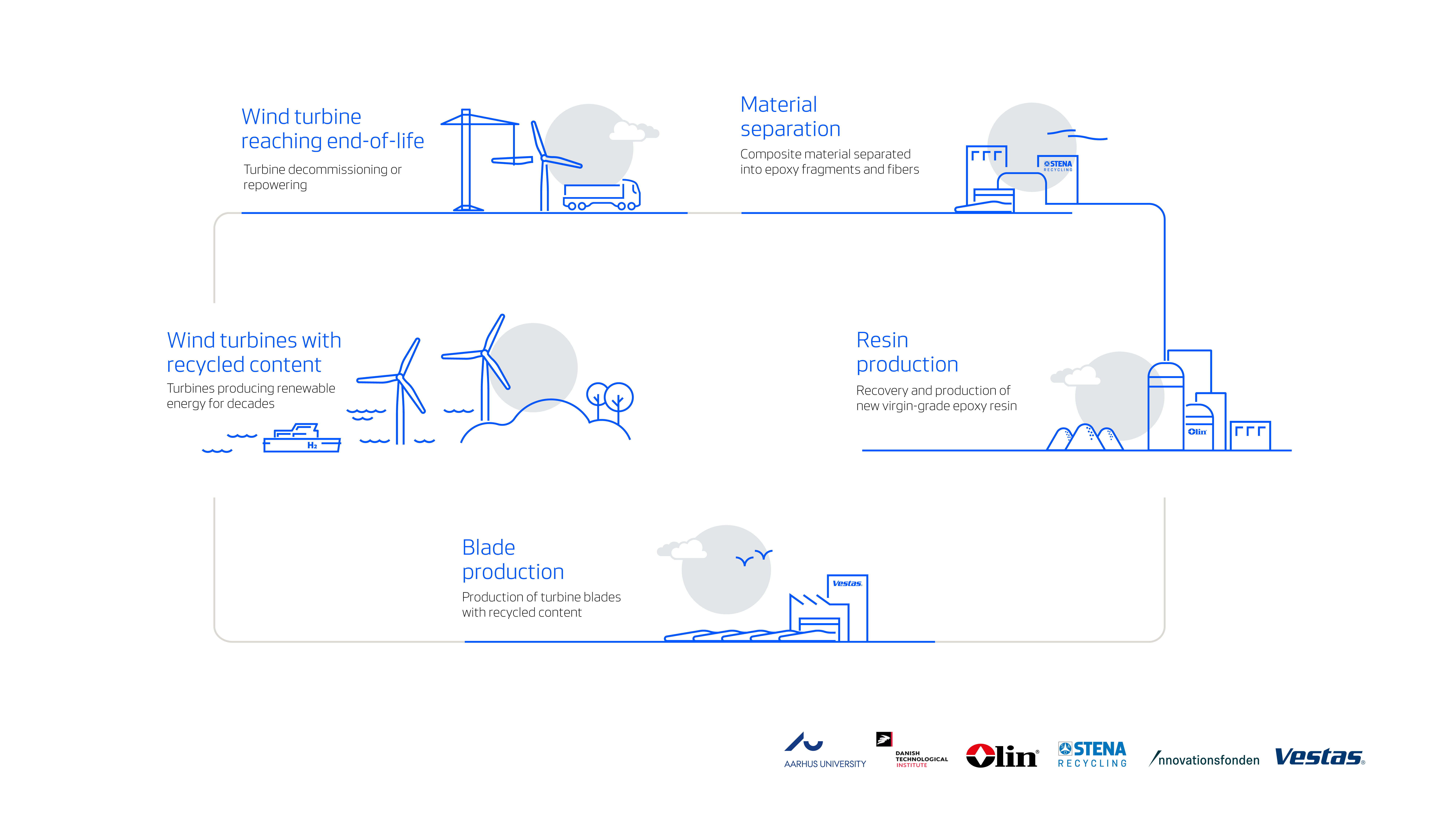Circularity solution to end landfill for turbine blades
Aarhus University and Troels Skrydstrup's research group have, as CETEC partner, contributed with the technology to render epoxy-based turbine blades as circular, without the need for changing the design or composition of blade material. Combining newly discovered chemical technology developed in collaboration within the CETEC initiative, the solution can be applied to blades currently in operation. This will eliminate the need for blade redesign, or landfill disposal of epoxy-based blades when they are decommissioned.


“Until now, the wind industry has believed that turbine blade material calls for a new approach to design and manufacture to be either recyclable, or beyond this, circular, at end of life. Going forward, we can now view old epoxy-based blades as a source of raw material. Once this new technology is implemented at scale, legacy blade material currently sitting in landfill, as well as blade material in active windfarms, can be disassembled, and re-used. This signals a new era for the wind industry, and accelerates our journey towards achieving circularity,” says Lisa Ekstrand, Vice President and Head of Sustainability at Vestas.
Turbine blades have previously been challenging to recycle due to the chemical properties of epoxy resin, a resilient substance that was believed to be impossible to break down into re-usable components. This has led to many technology leaders attempting to replace or modify epoxy resin with alternatives that can be more easily treated. CETEC’s solution is enabled by a novel chemical process that can chemically break down epoxy resin into virgin-grade materials. The chemical process was developed in collaboration with Aarhus University, Danish Technological Institute, and Olin the partners of the CETEC project, a coalition of industry and academia established to investigate circular technology for turbine blades.
“The newly discovered chemical process can theoretically turn epoxy-based turbine blades, whether in operation or sitting in landfill, into a source of raw material to potentially build new turbine blades. As the chemical process relies on widely available chemicals, it is highly compatible for industrialisation, and can therefore be scaled up quickly. This innovation would not have been possible without the ground-breaking CETEC collaboration between industry and academia enabling our progress until this point”’ says Mie Elholm Birkbak, Specialist, Innovation & Concepts at Vestas.
Through a newly established value chain, supported by Nordic recycling leader Stena Recycling and global epoxy manufacturer Olin, Vestas will now focus on scaling up the novel chemical disassembly process into a commercial solution. Once mature, the solution will signal the beginning of a circular economy for all existing, and future epoxy-based turbine blades.
“As the leading customer solution provider of innovative epoxy systems, Olin is proud to support the anticipated massive expansion in wind energy worldwide. By utilising unique technologies, together with our partners, we are ready to recover molecules and convert them into new epoxies that can be re-used in wind turbine blades. We are excited to bring our expertise and unique asset footprint to this partnership, and realize breakthrough sustainable material solutions for existing wind blades and those of the future”, says Verghese Thomas, Vice President, Epoxy Systems and Growth Platforms at Olin.
“In the coming years, thousands of turbines will be decommissioned or repowered, representing a major sustainability challenge but also a valuable source of composite materials. As one of Europe’s leading recycling groups with a wide footprint in Europe, we have a central role in the transition to a circular economy. We see this solution as a huge opportunity to take part in making a sustainable solution even more sustainable and circular and are ready to apply our chemical recycling expertise and knowledge to this process”, says Henrik Grand Petersen, MD Stena Recycling Denmark.
For several decades, producing wind turbine blades manufactured with epoxy-based resin has been standard practice in the wind industry. In the most mature markets for wind energy, the first turbines are reaching the end of their operational life and this will increase over the coming years. WindEurope expects around 25,000 tonnes of blades to reach the end of their operational life annually by 2025.
Once mature, the new solution will provide Vestas with the opportunity to produce new turbine blades made from re-used blade material. In the future, the new solution also signals the possibility to make all epoxy-based composite material a source of raw material for a broader circular economy, potentially encompassing industries beyond wind energy.
For more information
Professor Troels Skrydstrup
Department of Chemistry & iNANO
Aarhus University
Email: ts@chem.au.dk
Read original press release by VESTAS.
About Vestas
Vestas is the energy industry’s global partner on sustainable energy solutions. We design, manufacture, install, and service onshore and offshore wind turbines across the globe, and with more than 160 GW of wind turbines in 88 countries, we have installed more wind power than anyone else. Through our industry-leading smart data capabilities and unparalleled more than 140 GW of wind turbines under service, we use data to interpret, forecast, and exploit wind resources and deliver best-in-class wind power solutions. Together with our customers, Vestas’ more than 28,000 employees are bringing the world sustainable energy solutions to power a bright future
For updated Vestas photographs and videos, please visit our media images page on: https://www.vestas.com/en/media/images.
We invite you to learn more about Vestas by visiting our website at www.vestas.com and following us on our social media channels:
- www.twitter.com/vestas
- www.linkedin.com/company/vestas
- www.facebook.com/vestas
- www.instagram.com/vestas
- www.youtube.com/vestas
About Olin
Olin Corporation is a leading vertically-integrated global manufacturer and distributor of chemical products and a leading U.S. manufacturer of ammunition. The chemical products produced include chlorine and caustic soda, vinyls, epoxies, chlorinated organics, bleach, hydrogen, and hydrochloric acid. Winchester's principal manufacturing facilities produce and distribute sporting ammunition, law enforcement ammunition, reloading components, small caliber military ammunition and components, and industrial cartridges.
For more information, visit www.olin.com
About Stena Recycling
Stena Recycling plays an important and central role in the transition to a circular economy by offering services and comprehensive solutions within recycling and efficient resource management. With more than 3000 committed employees and 178 facilities across eight markets, Stena Recycling annually recycles nearly six million tons of waste and end-of-life products from more than 100,000 customers across a range of industries. The recycled raw materials, including ferrous and non-ferrous metals, plastic, and paper, are resold as feedstock for the manufacture of new products. Stena Recycling operates in Sweden, Denmark, Norway, Finland, Poland, Italy, and Germany and the USA. Stena Recycling is part of the Stena Metall Group.
For more information, visit www.stenarecycling.com
About Danish Technological Institute
Danish Technological Institute (DTI) is an independent research and development institute. At DTI, we deliver sustainable and exceptional competitiveness through decisive technological knowledge translated into action. With more than 12,000 customers in 65 countries, we develop new knowledge through research and development activities in close corporation with Danish and international companies and research institutes.
For more info, visit www.dti.dk or contact project manager Søren Haack at sorh@dti.dk.
About Aarhus University
Aarhus University is a globally oriented, academically diverse, and research-intensive university. Aarhus University ranks among the top 100 universities in the world on several of the most important international ranking lists, out of over 17,000 universities worldwide. Around 12 per cent of AU’s 40.000 students are international, representing over 120 nationalities. Aarhus University offers state- of-the-art facilities and laboratories having a strong tradition of multidisciplinary research for instance in one of our 42 major research centres. The university’s goal is to contribute towards solving the complex global challenges facing the world. The university therefore strives to combine the high level of academic standards of its researchers with collaboration across disciplinary boundaries to combine research in new ways and solve challenges in close contact with the world around us.
For more information please visit: https://www.au.dk/
About the CETEC project
The CETEC (Circular Economy for Thermosets Epoxy Composites) initiative established in May 2021 by Aarhus University, Danish Technological Institute, Olin, and Vestas, and partly funded by the Innovation Fund Denmark focuses on advancing the adoption of a circular economy across the wind industry. The CETEC initiative is a three-year project that builds on the DreamWind initiative and addresses the lack of available recycling technology for epoxy resins. The project not only aims to increase the blade recyclability but also strives for full circularity by enabling to feed recycled materials of old blades back into the production of new blades.
